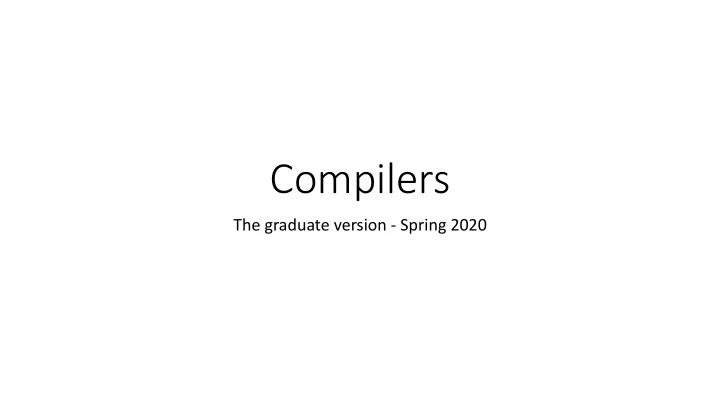

Compilers The graduate version - Spring 2020
Goals • To become knowledgeable of the foundational concepts underlying modern compiler optimization • To explore and understand the tradeoffs required when implementing scalable program analyses • To become familiar with a production-quality compiler system that you can use in your own research
A bit about me … • Worked as a compiler developer in industry from 1986-1990 • Doctoral work on data flow analysis • Have taken three courses in compilers (all grad courses) • Have taught undergrad and graduate compilers 20 times • 5 different instantiations of the course • Have implemented significant parts of 7 compilers • Most recently this summer (as you will see) • Lead research on topics that are closely related to compilation
From theory to normal engineering • in the 1960s compilation was art • in the 1970s compilation was theory , i.e., studied by theoreticians • in the 1980s and 90s compilation was engineering , i.e., studied as a software product line, supported by reusable programming frameworks and DSLs • in the 2000s those frameworks became more powerful • in the 2010s we finally figured out how to test them • it is one of the most mature software domains you will ever encounter
What is a compiler? Compiler a.out program.c
Front-end program.c Middle-end Back-end a.out
Front-end Scan Parse Weed program.c Type Symbol Middle-end Back-end a.out
Front-end Scan Parse Weed program.c Type Symbol Middle-end Code Gen Resource Back-end Peephole Emit a.out
p e r S o u r c e L a n Scan Parse Weed Front-end g Scan Parse Weed u Scan Parse Weed a program.c g e Type Symbol Type Symbol Type Symbol Middle-end Code Gen Resource Back-end Peephole Emit a.out
p e r S o u r c e L a n Scan Parse Weed Front-end g Scan Parse Weed u Scan Parse Weed a program.c g e Type Symbol Type Symbol Type Symbol Middle-end per Source Language Code Gen Resource Code Gen Resource Code Gen Resource Back-end Peephole Emit Peephole Emit Peephole Emit a.out
Compilers are … • Large complex software systems • GCC >7MSLOC • CLANG+LLVM >4MSLOC • Highly-structured software architectures • Well-defined interfaces • Components modularized and plug compatible • Focused on the input and output languages, e.g., for GCC • C, C++, Objective C, Ada, Fortran, Go, D, Cobol, Modula-2/3, … • arm, alpha, i386, mips, rs6000, sparc, … (51 currently) • We are going to side-step a lot of that complexity
Front-end Scan Parse Weed program.c Type Symbol Middle-end Code Gen Resource Back-end Peephole Emit a.out
Undergraduate Compilers Front-end Scan Parse program.c Type Symbol Code Gen Back-end a.out
This Class Front-end Type Middle-end Back-end
Static Program Analysis Type IR IR+invariants Facts about program Intermediate Representation behavior that always hold Middle-end IR IR+invariants
Static Program Analysis Type IR IR+invariants abstract syntax tree, symbol table, … x is an “integer” foo(x) returns an “integer” Middle-end control flow graph, IR IR+invariants dependence graph, call graph, … x+y is always z-10 p and q never point to the same memory foo() is always called with positive args
Compilers in three parts • Theory in a controlled environment • TIP – Tiny Imperative Language • Scala implementation of interpreter and analyses (with holdbacks) • Practice in the wild • tipc a compiler from (a subset of) TIP to LLVM bitcode • Yours to extend in a class project • Prompts to drive your exploration and learning • Analysis passes in LLVM
A degree of independence will be required • Theory in a controlled environment • TIP is 4500 SLOC of Scala • Much of it you will not need to touch or even look at • 46 lines marked “ ??? //<--- Complete here ” • Practice in the wild • tipc is about 1000 SLOC of C++ • Makes heavy use of LLVM APIs and coding idioms (smart pointers) • Uses ANTLR4 grammar and custom visitors for AST construction and code-gen • There is no TA • I can be of help for many issues (I implemented tipc) • I don’t use IDEs, so I can’t help with that, but I hear they are great
Recommend
More recommend